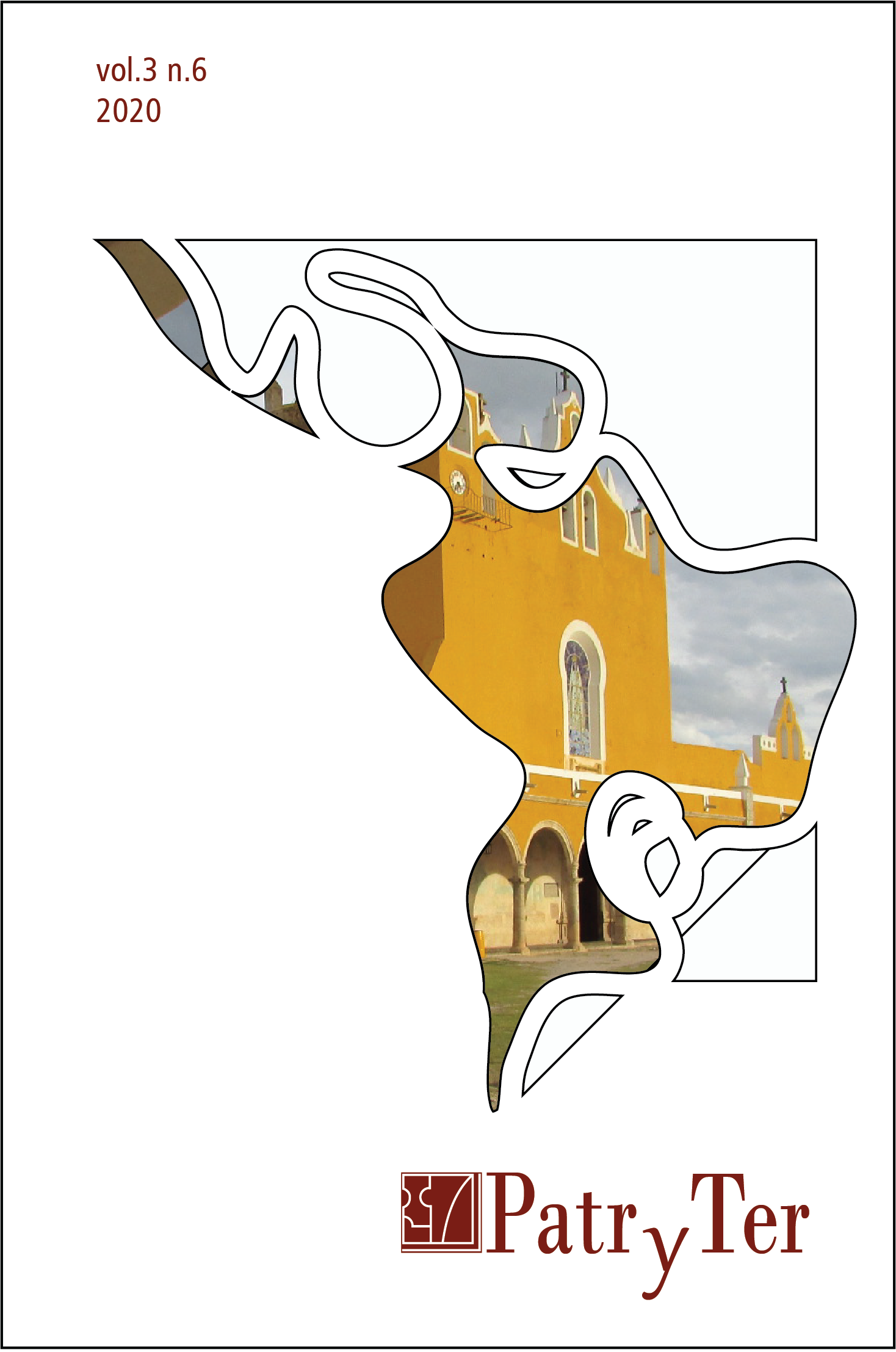Territorial conditioning and intertwined stories in Latin America
DOI:
https://doi.org/10.26512/patryter.v3i6.32144Keywords:
Geography. Latin America. Caribbean. Editorial. Gecipa.Abstract
In the context of the Latin American continent, the Mexican and Brazilian colonial experience (like all others) contain singularities that deserve to be emphasized. In a recent study, it was possible to recognize, once again, the dramatic plot of different forms of social existence in Latin America. The development of the project “Baroque conditioning of the New Spanish territory and Latin American original decoloniality: convents, prisons and Indian villages”, together with the IGG-UNAM, made it possible to understand how our territories and bodies were and continue to be conditioned and violated (with their people) under the cover of the discourse of freedom (yesterday) and democracy (today). The approach can be found in this new issue of PatryTer, which presents articles concerned with the socio-spatial destiny of our continent and the cultural values of its people, when it is going through one of the greatest crises in its history: from a deep political crisis to a miserable crisis of ideologies, at the core of a continuum of crises proper to European modernity from Latin America. This journal has focused on that concern (Mariano, 2020; Valverde, 2020; Alvarado, 2019; Ferreira & Araújo Sobrinho, 2019; Souza, 2019; Cabrales, 2018; Lemos, 2018, Alves, 2018, etc.).
Downloads
References
Alvarado, I. (2019). Territorio, memoria e imaginario del trabajo: la hacienda y el Ejido Colectivo en Nueva Italia, México. PatryTer, 2(3). https://doi.org/10.26512/patryter.v2i3.23063
Alves, V. J. R. (2018). A relação sociedade-natureza e a construção da ética do cuidado pelo turista. PatryTer, 1(2). https://doi.org/10.26512/patryter.v1i2.7149
Cabrales, L. F. (2018). Paisaje industrial y sus representaciones: La fábrica "La Parisiense" de Guadalajara durante el Porfiriato. PatryTer, 1(2). https://doi.org/10.26512/patryter.v1i2.9355
Costa, E. (2016). Utopismos patrimoniais pela América Latina: resistências à colonialidade do poder. Actas XIV Coloquio Internacional de Geocrítica. 1-32. Barcelona, España. Disponible en: http://www.ub.edu/geocrit/xiv_everaldocosta.pdf
Costa, E., & Moncada, J. (2020). “Condicionamiento barroco del territorio novohispano y decolonialidad originaria latinoamericana (conventos, presidios y pueblos de indios)”. Cuadernos de Geografía, Colombia, 30(1), (aprobado).
Costa, E. (2018). Proyecto Politico-Academico de la PatryTer - Revista Latinoamericana y Caribeña de Geografía y Humanidades. PatryTer, 1(2). https://doi.org/10.26512/patryter.v1i2.12298
Echeverría, Bolívar. (2000). La modernidad de lo barroco. México: Ediciones Era.
Ferreira, L. C. G., & Araújo Sobrinho, F. L. (2019). A produção canavieira e o mito do progresso: agronegócio e agricultura familiar na microrregião de Ceres, Goiás, Brasil. PatryTer, 2(3). https://doi.org/10.26512/patryter.v2i3.15648
Ianni, O. (2011). Ciência e Utopia. In: A sociologia e o mundo moderno. São Paulo: Civilização Brasileira.
Lemos, A. I. G. (2018). Cidades, território e memória na América Latina: um olhar através das suas metrópoles. PatryTer, 1(2). https://doi.org/10.26512/patryter.v1i2.9281
Mariano, N. de F. (2020). Festa do Divino Espírito Santo, uma tradição em movimento. PatryTer, 3(5), 58-71. https://doi.org/10.26512/patryter.v3i5.26908
Marx, K. (2003). Manuscritos econômicos filosóficos. São Paulo: Martin Claret, 2003.
Souza, M. (2019). Territorio usado, rugosidades e patrimonio cultural: ensaio geográfico sobre o espaço banal. PatryTer, 2(4). https://doi.org/10.26512/patryter.v2i4.26485
Valverde, R. R. F. (2020). A heterotopia dos museus brasileiros e os deslocamentos da Modernidade. PatryTer, 3(5), 14-29. https://doi.org/10.26512/patryter.v3i5.27267
Downloads
Published
Issue
Section
License
Copyright (c) 2020 PatryTer

This work is licensed under a Creative Commons Attribution-NonCommercial-NoDerivatives 4.0 International License.
Please be advised that Revista Patryter is licensed under a Creative Commons Attribution-NonCommercial-NoDerivatives 4.0 International License (CC BY-NC-ND 4.0) https://creativecommons.org/licenses/by-nc-nd/4.0/deed.en
Authors who publish in the PatryTer Magazine agree to the following terms:
- Authors retain the copyright and grant the journal the right of first publication, the work being simultaneously licensed under the Creative Commons Attribution-NonCommercial-NoDerivatives 4.0 International License (CC BY-NC-ND 4.0) which allows the sharing of the work with recognition of the authorship of the work and initial publication in this journal.
- The contribution is original and unpublished and is not being evaluated for publication by another journal. When submitting the article, authors should attach as a supplementary document a Letter addressed to the PatryTer's Editor, indicating the academic merits of the submitted work (relevance, originality and origin of the article, that is, from what type of research]. This letter must be signed by all authors.
- Authors assign the copyright of the work that they present to the Editorial Board of PatryTer Magazine, which may serve the article in the PatryTer Magazine and in public and private databases in Brazil and abroad.
- Authors declare that they are fully responsible for the entire contents of the contribution that they submit to the Editorial Board of PatryTer Magazine.
- Authors declare that there is no conflict of interest that could interfere in the impartiality of the scientific papers submitted to the PatryTer Magazine Editorial Board.
- Authors are authorized to take additional contracts separately, for non-exclusive distribution of the version of the work published in this journal (eg publish in institutional repository or as a book chapter), with acknowledgment of authorship and initial publication in this journal.
Authors are allowed and encouraged to publish and distribute their work online (eg in institutional repositories or on their personal page) at any point before or during the editorial process, as this can generate productive changes as well as increase the impact and the citation of the published work (See The Effect of Free Access).



